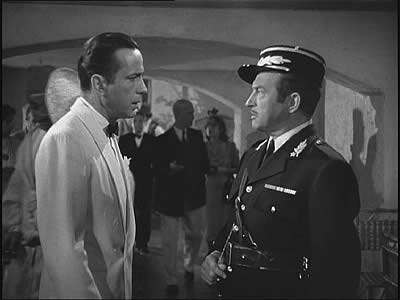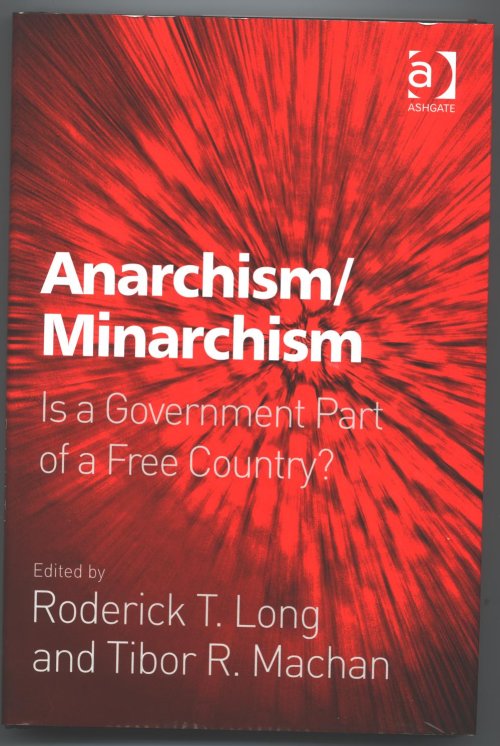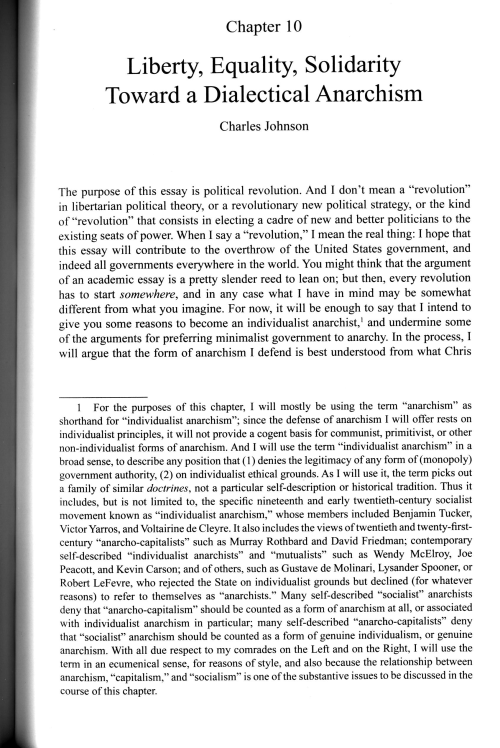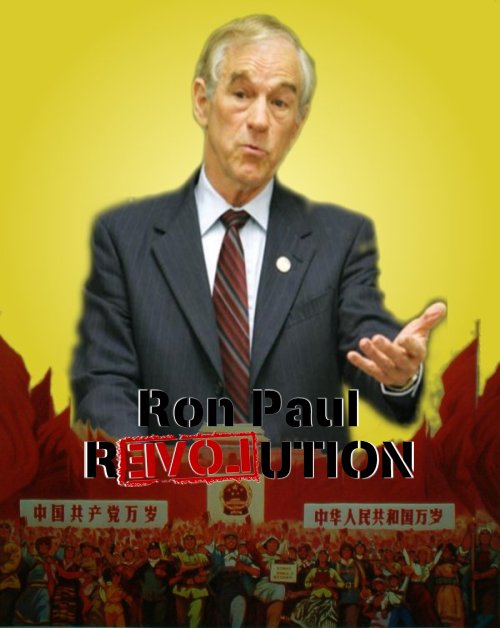(Thanks to Austro-Athenian Empire 2008-01-28 and Wendy McElroy 2008-01-22, which each have some excellent comments. Read the whole thing and all that.)
Cops in America are heavily armed and trained to be bullies. They routinely shove their way into situations where they aren’t wanted, aren’t invited, and have no business being; they deliberately escalate confrontations in order to stay in control
through superior belligerence; they commonly use force to end an argument and then blame it on their victim; and they invariably pass off even the most egregious abuses of power as self-defense
or as the necessary means to accomplish a completely unnecessary goal. Cops carry a small armory of weapons and restraints that they can freely use to hurt or immobilize harmless or helpless people, and a small library of incredibly vague laws (disorderly conduct,
resisting a police officer
) that they can use as excuses for hurting, restraining, and arresting their victims, with virtually no danger of ever being called to account for their actions as long as other cops, who already have a professional interest in minimizing or dismissing complaints about abusive pigs, can figure out some way to fit the use of these incredibly vague offenses
into the police department’s incredibly vague Official Procedures for arrests and for the use of force. The practical consequence of their training and the institutional culture of impunity within which they operate are squads of arrogant, unaccountable, irresponsible hired thugs with massive senses of entitlement, organized into a paramilitary chain of command, who contemptuously regard their neighbors as mere civilians,
who treat anyone who dares to give them lip or who questions their bellowed commands as a presumptive criminal, who have no scruple against using pain or arrest in order to force you to comply
with their arbitrary orders, and who excuse any sort of abuse by sanctimoniously informing you that it became necessary to stomp on you in order to protect
you — whether or not you ever asked for the protection
in the first place.
Thus, a couple weeks ago, in Clearwater, Florida, Jean Merola, a 75-year-old grandmother of eight, got served and protected at the drive-thru of her neighborhood McDonald’s by Officer Matthew Parco, who happened to be behind her in the line and who took it upon himself to do some policing of the McDonald’s parking lot — without ever having been asked to by anybody at McDonald’s, of course, and in fact hassling, escalating a confrontation with, and then finally handcuffing and arresting Jean Merola for parking her car exactly where the cashier at McDonald’s had told her to park:
About 4 p.m. Thursday, Merola pulled her gray Lincoln Town Car up to the drive-through window of a Clearwater McDonald’s minutes from her home. She ordered the coffee and medium fries, no salt.
No salt on fries being a special request, the teller told Merola to pull forward to an area of striped asphalt where customers are typically asked to wait if their orders will take some minute.
Suddenly, Merola heard a car horn blasting behind her. In his cruiser sat Officer Matthew Parco, 30, a member of the force since December 2006. He kept honking and waving his arms, Merola said.
She did nothing.
Then he stepped out of his cruiser, walked up to Merola’s driver side door and asked for her license and registration. Merola bristled. Not until you tell me what I’ve done wrong, she told him.
He told me something about being parked in this particular place,
Merola said Friday. I told him this is where the people from McDonald’s told me to park.
— Will Van Sant, St. Petersburg Times (2008-01-19): Her wait for french fries ends with a taste of jail
Little did she know that the McDonald’s parking lot, just like everywhere else in the city, happens to be Officer Matthew Parco’s proprietary domain, and if he tells her to move her car away from where the business occupying the lot told her to move it, she’d better ask How fast,
damnit. If she doesn’t recognize her civic duty, it’s probably because she’s old and crazy:
In his report, Parco says he asked Merola to move the Town Car forward a foot to allow cars in line to go around. If he did, Merola said she doesn’t remember it. And it was actually his cruiser blocking people, she said.
But Merola said she was really offended when Parco called a supervisor to say he had a possibly demented woman on his hands who might need to be held under the state’s Baker Act.
— Will Van Sant, St. Petersburg Times (2008-01-19): Her wait for french fries ends with a taste of jail
The Baker Act is a Florida state law which allows any government cop, more or less at his pleasure, to legally declare that you must be crazy and arrest you so that he can force you to undergo a psychiatric exam, possibly to be followed by involuntary commitment
to a government-approved psychoprison hospital ward. This unchecked and almost completely discretionary power to ruin your life on a cop’s whim is all For Your Own Good, of course.
He was aggravating me by saying that,
Merola said. I said, I don’t have dementia, tell your supervisor.
By then, Merola had called Parco a brat, but the dementia comment stirred anger. Merola upped the ante and called him a smart a–
and a dumb s—.
She’s never been easily pushed around, her daughter said Friday.
She’s not a meek and mild little old lady,
said Deborah Burge of Palm Harbor. She’s going to say, Hey, what did I do wrong?
Parco handcuffed Merola behind her back and put her in his cruiser. Another officer arrived and drove her to the Pinellas County Jail, where the widow of 10 years was booked for disorderly conduct. She had no previous criminal record.
— Will Van Sant, St. Petersburg Times (2008-01-19): Her wait for french fries ends with a taste of jail
The cops kept her handcuffed for an hour, to protect themselves from the obvious danger posed by a crying 75-year-old woman. For the terrible and dangerous crime of demanding to know what she did to deserve a cop getting in her face, for not flashing her papers on demand, and for offending against the grave dignity of a petulant, pushy, and insulting Officer Of The Law, Officer Matthew Parco had Jean Merola locked in a cage for the afternoon, and meanwhile impounded her car (which it cost her $160 to recover once she was free).
Trying to account for her own behavior, Merola said she was taught to respect the police because they are there to protect and help you. It’s a message she said she had passed on to her three children.
Despite the uniform, she suggested, Parco just didn’t seem like the real thing.
I guess I felt he wasn’t a police officer,
Merola said. He wasn’t there to help me, he was there to be mean to me.
— Will Van Sant, St. Petersburg Times (2008-01-19): Her wait for french fries ends with a taste of jail
Jean Merola no doubt meant that in a metaphorical sense. But I think there’s a very literal sense in which she is right. Professional police are, and ought to be regarded as, ordinary mortals, just like you and me. They are not a special or superior class, and they neither require special privileges nor deserve special immunities from what we normally expect from ordinary decent and honest people. If I got up in an old lady’s face face, implicitly called her crazy, threatened to have her committed, and then responded to the insults that my unhinged behavior so clearly merited by pulling her out of her car, cuffing her behind her back, and locking her in a cage, you’d consider me an asshole, at least. If I did all that based on a complete mistake, in which I barged onto somebody else’s property, ignorantly ordered around people in their parking lot, and then, when corrected about the owner’s policy for use of the parking lot, insisted that I was entitled to tell them how they should run their own damn parking lot and to yell at or arrest anybody who didn’t pay attention to my ideas about how it should be used, you would consider me not only an asshole, but a dangerous lunatic and a menace to public safety. Respect and courtesy are for those who earn it, not for any two-bit punk who figured out how to put on a uniform and swing a night-stick. Those who are actually protecting identifiable innocent people from harm–and I mean in their actions, not in their mission statements–have every right to do what they are doing, and every right to use force to defend others against aggression. Those who think their dress-up games entitle them to shove around old ladies, tell McDonald’s how to do their own job, and lock away anyone who dares question or insult them have no right to exercise force and no entitlement to be treated with anything other than the contempt that any violent bully deserves.
Further reading:




